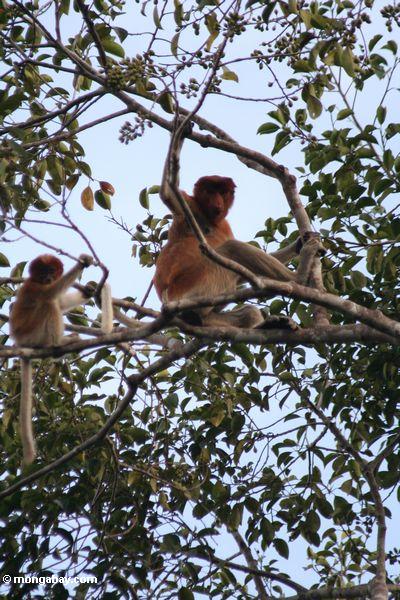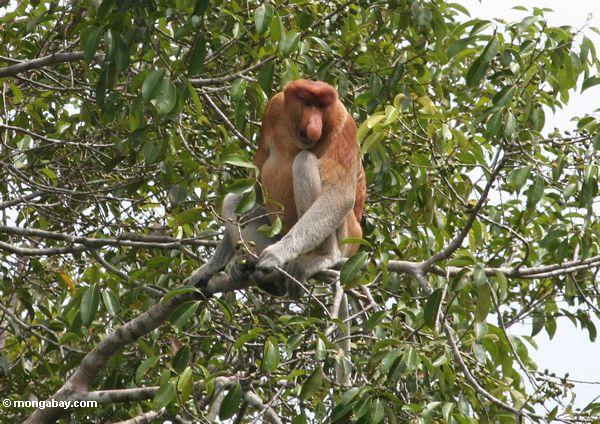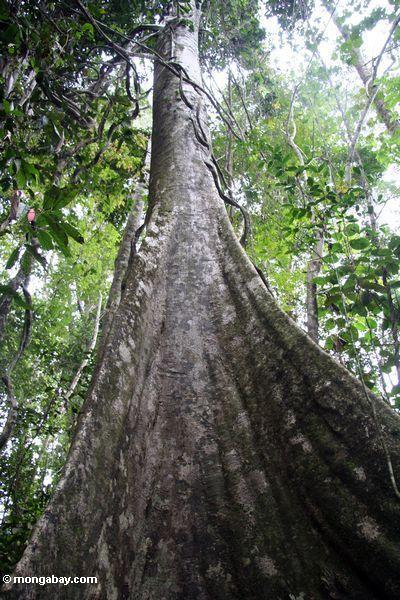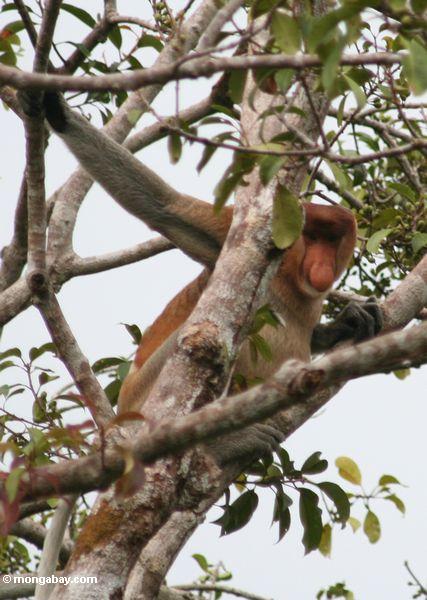|
|

|
|
The importance of rainforest trees Chapter 5: Where Mongy talks to a tree By Christa Maas Mongy's favorite way to start a conversation is "Christa, I have a question." Mongy has a lot of questions, and usually they need really urgent answers. (Of course, Mongy would argue, that all questions are urgent!) But, Mongy always asks his really important questions at really inconvenient times. I was comfortably resting on the bed while enjoying a green mud mask on my face when Mongy looked at me thoughtfully: "If there are so many trees in the world and together they make a forest, then why is each individual tree so important? What does one tree do?" I started to explain that trees absorb carbon dioxide from the air through their leaves and transform it into oxygen but Mongy interrupted me and said: "Christa, I want to talk to a tree. I want to ask the oldest tree in the forest myself." "O.K, Mongy, but in order to be able to do that we will have to hike deep into the mountain where the rainforest is still untouched by human hand." "Well, what are we waiting for! Let's go!" demanded the ever so impatient Mongy. Soon after, we were on our way to find the oldest tree in the rainforest. (I know better than to make Mongy wait when he has "a really important question that really needs a quick answer") I remember it was the day I had found out that Mongy was afraid of crocodiles. We were about to board a small motorboat when Mongy refused to move: "I am not going on the river!" "What do you mean your not going on the river? How else are we going to be able to travel?" I protested. "What are you afraid of? After all, you hang over the river all the time when you stick to your leaves!" "Sticking to a leaf is not being on the water," he replied, "it's safe, and the monsters can't jump that high!" "What kind of monsters are you talking about, Mongy?" "The giant swimming lizards with big teeth that look like harmless log-kind-of-monsters that eat frogs." "Oh, you mean crocodiles!" "Crocodiles" repeated Mongy, who had just learned a new word. "My second cousin's great grandfather was eaten by a crocodile!" It took me some time to convince Mongy that crocodiles don't eat motorboats. First of all, they can't digest them, but mostly because they are afraid of the noise the motors make. Even then, Mongy only agreed to board the boat safely hidden under the straw hat I had been wearing all day. We were slowly heading downstream, enjoying the scenery and wildlife when Mongy suddenly broke into loud laughter: "Look at those noses" he panted. 
The noses he was referring to belonged to a group of Borneo's famous Proboscis monkeys. I stopped the boat to find out what they were up to. "Ethan! Ethan! Ethan!" cheered the group. I noticed that Ethan was a particularly athletic-looking monkey and that he seemed to be considering diving into the river while being cheered on by his fellow monkeys. "Hello, Ethan," I introduced myself "I am Christa. What are you guys up to?" "We are the MI 6" replied Ethan. "That stands for Monkey Intelligence number 6 and I am champion swimmer Ethan Swimmfast Hunt, codename ESH. This is "Operation River Crossing" My mission is to swim across very fast, to make sure there are no crocodiles and then let the rest of the group follow safely. It's a great mission!" "My second cousin's great grandfather was eaten by a crocodile!" said Mongy, still hidden beneath my straw hat. 
"The idea is not to be eaten!" responded Ethan, a little confused about why my hat could talk. "I am the fastest swimmer, so I have the Proboscis honor to go first." And with that, he jumped into the river. "Ethan, Ethan, Ethan" cheered MI 6. "Be careful not to be eaten by a crocodile like my second cousin's great grandfather!" warned my hat. But Ethan was really living up to his name, and once he had crossed safely, the rest of the group hollered "River Crossing" before plunging in as well, and Mongy and I continued our journey with great relief. Soon after, we reached a small clearing and Mongy jumped up and declared that he had found the oldest tree in the rain forest. I had the slight suspicion that he was just getting tired and impatient again because the Ramin Tree Mongy pointed out is still a common tree in Borneo, but I kept this thought to myself. But it was a memorable sight! Mongy looked so tiny while sitting in front of an almost 40-meter tall Ramin Tree with more than 150 meters in diameter. I think he completely forgot I was there while he talked to the tree and learned all there was to know. This is what the tree said to Mongy: 
"My dear, little Mongy! Even a single tree is useful because it provides a home for insects, birds and mammals. I give you shade from the sun and it's harmful ultra-violet rays and shelter you from the wind and the rain. The moisture that evaporates from my leaves will cool the surrounding air. A tree can produce fruit, nuts, flowers or other useful products for you. My roots keep slopes from eroding and stabilize the soil and even make it richer with decaying wood and leaves. We trees works like filters and cleans the air from harmful gases like carbon monoxide, nitrogen dioxide and sulphur dioxide; while our roots will trap toxic particles and dust. We can even reduce noise and give you a better quality of life. The wind told me a beautiful story about a poor human who lived on the bank of a river that flows through a gray stone city and how he understood the importance of even as single tree. This human lived in a small shack he had built out of leftover construction material, cardboard and what ever else he could find. His job was to watch the dark slopes of the river bank, so that no one would go there to commit crimes. He was very sad when he saw that there were hardly any trees, and all life in the river was dying slowly. One day, he found a tree that someone had thrown away in the trash. He took it home and planted it next to his shack. It looked beautiful and so peaceful! This gave him an idea. He started to collect plants from the trash wherever he could and learned how to raise little seedlings. He used empty plastic bottles, aluminum cans as containers. He even made his own compost from trash and dug up dirt for planting. Little by little he planted more than 500 trees, all raised and tended to lovingly all the time. And slowly the riverbank started to look greener and the trees started to help clean the river a little through their roots. Ten years later the new major of the city saw how much greener the river bank had become. He decided to start a program to clean up the river and to put an agronomist in charge of planting more trees. Now there was lots of money and press and television coverage for the major. They called him a visionary and an ecologist. "But what happened to the man who started all this?" asked Mongy. "He is the true hero!" "No one knows! He probably still lives in the same old shack - or maybe he moved to another river that needed him. But he taught everyone the importance of trees and green areas. He also taught the people that you don't need a lot of money to make a city beautiful again. You can do so much by taking little steps; one at a time. More green areas and more trees will always improve the quality of your life!" Mongy agreed. He had learned a lot himself. He always used the bottom of leaves to hang over rivers in order to maintain the moisture he needed, but he had taken them for granted. He thanked the tree and promised to remember the importance of even a single tree. He sat there looking dreamily up at the jungle canopy and suddenly he exclaimed: "Christa, I know why trees are green!" "Why are they green, Mongy?" I asked 
"Because it's God's favorite color!" he smiled, his big eyes brimming with pride. "Oh, Mongy, what a beautiful thing to say! You really have learned something today, haven't you! You are such a smart little frog!" I exclaimed. It was time for us to head back and again Mongy took refuge under my straw hat. We travelled fast and it didn't take long until we came upon the group for Proboscis monkeys we had seen earlier, and who were now getting ready to cross the river again on their way home. "Hello, Ethan!" I smiled, ready for another fast swim?" "Hello, lady with the talking hat" replied Ethan. " Well, actually, we were waiting for you. We noticed that crocodiles are afraid of the noise the motor of your boat makes. So, if we jump in as soon as you pass, we can all swim across together!" "Well, Ethan, then you won't need a champion swimmer anymore, will you?" I enquired. "Will you still be the mission leader?" 
"I certainly will" answered Ethan. "It was all my idea! We now have a real Monkey Intelligence 6, and I have already designed a new mission. It's called "Operation Brains over Brawn", and I am the brain!" Mongy, who was still hiding, started laughing: "Hahaha. It looks like we all have learned something today!" "Oh, we learn something new every day" answered Ethan, as our boat was slowly passing by. "I, for one could have sworn that straw hats can't talk, and now I know they do!" Before I had a chance to explain anything, he and the other members of MI6 shouted "Brains over Brawn" and plunged into the river while a really dumbfounded crocodile watched them from a safe distance. Chapter 1: Meeting Mongy the Bay Frog Chapter 2: Mongy the Bay Frog's Family Chapter 3: Mongy the Bay Frog's meets Ringo the orangutan Chapter 4: Palm oil and rain forests Chapter 6: Capture and escape! |
 |
The Adventures of Mongy the Frog
|
|
|
|
worldrainforests.com/kids is published under a creative commons license.  
©2010 mongabay.com |
